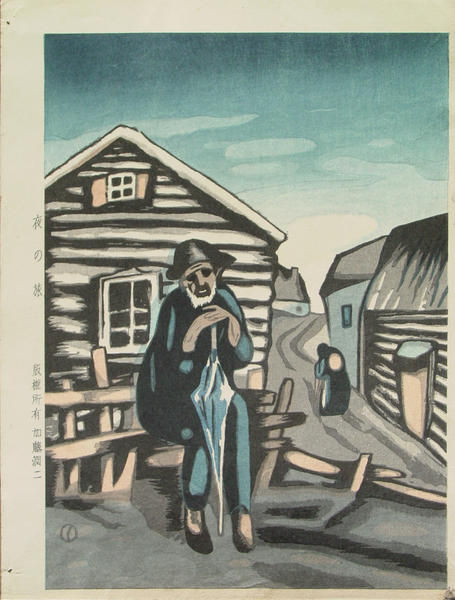| | |
| Artist: | Takehisa Yumeji (1884-1934) — 竹久夢二 |
| Title: | Night Trip — 夜の旅 |
| Series: | Yumeji Masterpieces — 夢二名作集 |
| Date of first edition?: | 1938-1939 |
| Publisher (first edition)?: | Kato Junji |
| Publisher (this edition)?: | Kato Junji |
| Medium (first edition): | Woodblock |
| Medium (this edition): | Woodblock |
| Format (first edition): | Aiban
|
| Format (this edition): | Aiban |
| DB artwork code: | 48044 |
| Notes (first edition)?: |
|
| Notes (this edition)?: |
| The following information was taken from the original web listing of this artwork. Note that there may be some inaccuracies:
Thanks to The Lavenberg Collection of Japanese Prints for this entry.
Print Details
Title: Night Trip 夜の旅 - as written in the top of the left margin
Series: Yumeji’s Masterpieces 夢二名作集 Yumeji meisakushū
Artist: Takehisa Yumeji (1884-1934)
Signature: unsigned
Seal: artist's comma-shaped (tomoe) seal
Publication Date: originally 1938-1939
Edition unknown - prints from the series were reprinted an unknown number of times during the life of the publisher.
Publisher: Katō Junji 加藤潤二 [Katō Hanga Kenkyūjo]
copyright owned by Katō Junji Hanken shoyū Katō Junji 版権i所有 加藤潤二 - as printed in left margin
Genre: fukusei hanga
Miscellaneous: "1 yen 79 sen" and "Approval by Nihon Mokuhanga Kogyo kyotai"
Labels attached to print verso.
Format: ōban
H x W Paper 13 x 9 7/8 in. (33 x 25.1 cm)
H x W Image 12 x 8 5/8 in. (30.5 x 21.9 cm)
Japanese Color Woodblock Print
Night Trip
from the series Yumeji’s Materpieces
by Takehisa Yumeji, 1938-1939
(after an earlier 1923 design)
About This Print
One of a number of posthumous prints created from Yumeji's illustrations by the Tokyo-based publisher Katō Junji. This design was originally made for the below 1923 cover of a musical score of Anton Rubinstein's Wanderer's Night Song, published by Senow Ongaku Shuppansha.
Night Trip is a most "Munch-looking" work. Is the small figure walking down the path the wife of the elderly gentleman? Is it her "night trip" or will the old gentleman be heading off on his own trip? He looks so tired and forlorn. Yumeji's work of this period is described by Michiaki Kawakita as having taken "on the appearance of what might be called faded nanga: paintings in which there was at times a touch of futurism and at times a bleak loneliness."1
1 Modern Currents in Japanese Art, Michiaki Kawakita, Weatherhill/Heibonsha, 1974, p. 121. |
|
| Series Information: |
| The majority of Yumeji's woodblock-printed designs were released after his death in 1934. The publisher who was instrumental in having Yumeji's work recognized was the Tokyo-based Katō Junji (1885-1961). During the late 1930s and early 1940s. Katō and his team of artisan block-cutters and printers at the Katō Print Workshop (Katō Print Workshop) (Katō Hanga Kenkyūjo) reused and recalled numerous famous paintings, music scores and watercolours for series of prints and postcards. The thirty woodblock prints in this set are a selection of the most popular cover designs from the over 270 that the artist produced of Seno music scores. Katō Junji personally compiled the set and it reflects what he believed was representative of Yumeji's artistic diversity, ranging from the portrayal of beautiful women and landscapes to this fascination with Western artistic styles. (from The Lavenberg Collection of Japanese Prints). |
|
| Artist Bio: |
Takehisa Yumeji (1884-1934) was a leading figure in the Taisho Romanticism movement that combined Western romanticism with native Japanese styles during the Taisho Period (1912-1926). He was a painter, writer, poet, bookbinder and illustrator whose drawings of women with thin bodies and large eyes filled with melancholy were known as Yumeji Bijin-ga. During the height of his popularity he was called the “modern Utamaro” and the Japanese “Toulouse-Lautrec and Edvard Munch”. His prints epitomized the relationship between popular art and the woodblock.
|
|


